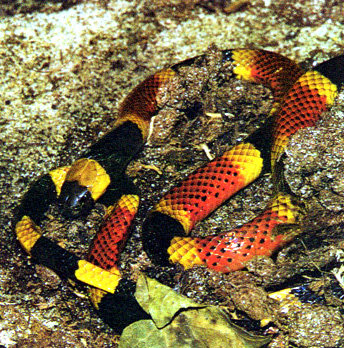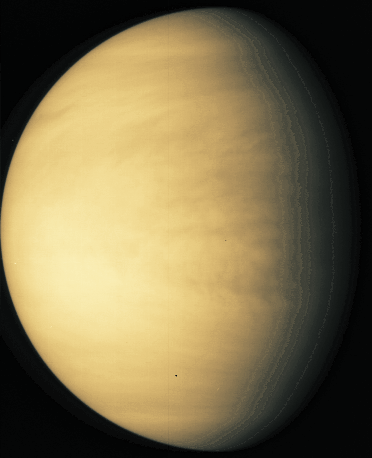Find the answer in my Science & Stuff page!
This
edition: more excerpts from my CD (Debbie Dooley's Know-it-all
Pedia)
including
 |
My Nothing but
the FAQs page takes a look at the collapse of
the World Trade Center
Towers; there are some neat, simple
gadgets you can make
at home which you will see in my Debbie's
Laboratory page, and
you catch one of my crime-solving cases.
My Geographic World
page explores the world of nature's
most repulsive creatures!
 
|
What is the greenhouse
effect ?
The pressure of Venus'
atmosphere at the surface is 90 atmospheres (about the same as the pressure
at a depth of 1 km in Earth's oceans). It is composed mostly of carbon
dioxide. There are several layers of clouds many kilometers thick composed
of sulfuric acid. These clouds completely obscure our view of the surface.
This dense atmosphere produces a run-away greenhouse effect that raises
Venus' surface temperature by about 400 degrees to over 740 K (hot enough
to melt lead). Venus' surface is actually hotter than Mercury's despite
being nearly twice as far from the Sun. There are strong (350 kph) winds
at the cloud tops but winds at the surface are very slow, no more than
a few kilometers per hour.
Here's one interesting opinion on the greenhouse effect I found on the Web: The greenhouse effect
is caused when
First, Lets get one thing straight. The greenhouse effect
and global warming
Silly copy There is a greenhouse effect, but, if there were not, we would all be dead! It is becoming increasingly clear that we are also experencing global warming, but, that is a different matter. The greenhouse effect is the name applied to the process which causes the surface of the Earth to be warmer than it would have been in the absence of an atmosphere. (Unfortunately, the name, greenhouse effect is a misnomer --- more on that later.) Global warming is the name given to an expected increase in the magnitude of the greenhouse effect, whereby the surface of the Earth will amost inevitably become hotter than it is now. This page only treats
the greenhouse effect --- not global warming.
Second, Lets establish why there is a greenhouse effect. The surface of the
Earth is warmer than it would be in the absence of an atmosphere because
it receives energy from two sources: the Sun and the atmosphere.
The atmosphere emits radiation for the same reason the Sun does: each has a finite temperature. So, just as one would be warmer by sitting beside two fireplaces than one would have been if one fireplace were extinguished, so, one is warmer by receiving radiation from both the Sun and the atmosphere than one would be if there were no atmosphere. Curiously, the surface of the Earth receives nearly twice as much energy from the atmosphere as it does from the Sun. Even though the Sun is much hotter, it does not cover nearly as much of the sky as does the atmosphere. A great deal of radiation coming from the direction of the Sun does not add up to as much energy as does the smaller portion of radiation emitted by each portion of the atmosphere but now coming from the whole sky. (It would take about 90,000 Suns to paper over the whole sky). So, it isn't even as
if our atmosphere had only a minor influence on the surface temperature;
it has a profound one. In the absence of an atmosphere the Earth would
average about 30 Celsius degrees (about 50 Fahrenheit degrees) lower than
it does at present. Life (as we now know it) could not exist.
Third, Lets examine some of the nonsense frequently offered in the name of science. Is the greenhouse effect a good thing? Well, yes, if you appreciate living. Does the atmosphere (or any greenhouse gas) act a blanket? At best, the reference to a blanket is a bad metaphor. Blankets act primarily to suppress convection; the atmosphere acts to enable convection. To claim that the atmosphere acts a blanket, is to admit that you don't know how either one of them operates. Does the atmosphere trap radiation? No, the atmosphere absorbs radiation emitted by the Earth. But, upon being absorbed, the radiation has ceased to exist by having been transformed into the kinetic and potential energy of the molecules. The atmosphere cannot be said to have succeeded in trapping something that has ceased to exist. Does the atmosphere reradiate? One often hears the claim that the atmosphere absorbs radiation emitted by the Earth (correct) and then reradiates it back to Earth (false). The atmosphere radiates because it has a finite temperature, not because it received radiation. When the atmosphere emits radiation, it is not the same radiation (which ceased to exist upon being absorbed) as it received. The radiation absorbed and that emitted do not even have the same spectrum and certainly are not made up of the same photons. The term reradiate is a nonsense term which should never be used to explain anything. Sometimes diagrams are drawn which show the radiation from the Earth's surface rising into the sky and being reflected off of the atmosphere (or clouds, or greenhouse gases). This too is nonsense. The radiation was not reflected, it was absorbed and different radiation was subsequently emitted. Does the atmosphere trap heat (in producing the greenhouse effect)? Alas no. As rapidly as the atmosphere absorbs energy it loses it. Nothing is trapped. If energy were being trapped, i.e. retained, then the temperature would of necessity be steadily rising. Rather, on average, the temperature is constant and the energy courses through the system without being trapped within it. Does the atmosphere behave like a greenhouse? The name, greenhouse effect is unfortunate, for a real greenhouse does not behave as the atmosphere does. The primary mechanism keeping the air warm in a real greenhouse is the suppression of convection (the exchange of air between the inside and outside). Thus, a real greenhouse does act like a blanket to prevent bubbles of warm air from being carried away from the surface. As we have seen, this is not how the atmosphere keeps the Earth's surface warm. Indeed, the atmosphere facilitates rather than suppresses convection. One sometimes hears the comparison between the greenhouse effect in the atmosphere (not in real greenhouses) and the interior of a parked car which has been left in the summer Sun with its windows rolled up. This comparison is as phony as is the comparison to real greenhouses. Again, keeping the windows closed merely suppresses convection. Whether the topic is
a real greenhouse or a car, one still hears the old saw that each stays
warm because visible radiation (light) can pass through the windows, and
infrared radiation cannot. Actually, it has been known for the better part
of a century that this has very little bearing on the issue.
|
||||
|
|||


